 Petzlover
Petzlover Bosnian Coarse-Haired Hound is originated from Bosnia and Herzegovina but Brussels Griffon is originated from Belgium. Bosnian Coarse-Haired Hound may grow 35 cm / 14 inches higher than Brussels Griffon. Bosnian Coarse-Haired Hound may weigh 18 kg / 40 pounds more than Brussels Griffon. Bosnian Coarse-Haired Hound may live 3 years more than Brussels Griffon. Bosnian Coarse-Haired Hound may have more litter size than Brussels Griffon. Both Bosnian Coarse-Haired Hound and Brussels Griffon requires Moderate Maintenance.
Bosnian Coarse-Haired Hound is originated from Bosnia and Herzegovina but Brussels Griffon is originated from Belgium. Bosnian Coarse-Haired Hound may grow 35 cm / 14 inches higher than Brussels Griffon. Bosnian Coarse-Haired Hound may weigh 18 kg / 40 pounds more than Brussels Griffon. Bosnian Coarse-Haired Hound may live 3 years more than Brussels Griffon. Bosnian Coarse-Haired Hound may have more litter size than Brussels Griffon. Both Bosnian Coarse-Haired Hound and Brussels Griffon requires Moderate Maintenance.
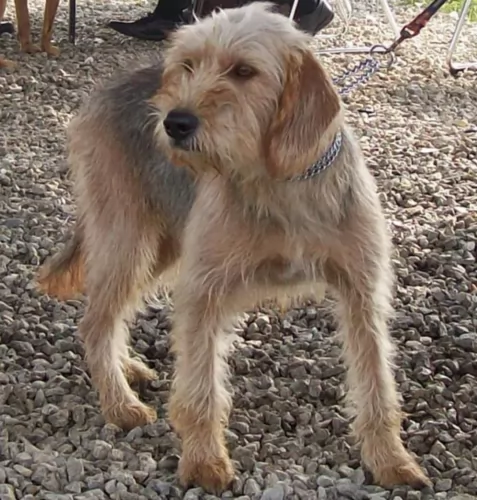 Once known as the Illyrian Hound and also known also as the Barak, the Bosnian Coarse-haired Hound was developed in Bosnia, and as a scenthound, it would hunt large game. Barak belongs to the hound group so typically this dog wants to chase wild game which he used to do long ago for his master.
Once known as the Illyrian Hound and also known also as the Barak, the Bosnian Coarse-haired Hound was developed in Bosnia, and as a scenthound, it would hunt large game. Barak belongs to the hound group so typically this dog wants to chase wild game which he used to do long ago for his master.
The breed was developed into what is's current looks are. In the 1890’s he was crossed with Italian gun dogs with local scent hound stock. It is a rare breed, and outside of Bosnia and Herzegovina, it is all but unknown.The dog is also known as the Bosnian-Rough-Coated Hound or the Illyrian Hound. In 2006 the breed was recognized by the United Kennel Club as the Barak in the Scenthound group. Unfortunately, while the Bosnian Coarse-Haired Hound is still found in Bosnia, there is plenty of conflict in the country, and the future of the dog is unknown.
 The Brussels Griffon is one of the three different types of Griffons. There is the Belgian, the Petit, and the Brussels Griffon. “Griffon” means wiry and the Brussels Griffon lives up to that moniker. The Brussels Griffon’s coat is longer than that of the Belgian Griffon and the Petit Brabanon (Griffon) has a smooth, short coat. The breed is probably originally developed by crossing Belgian street dogs with the Affenpinsher as early in the 1800’s. They were favored by the cabbies in Brussels as guard dogs. They were also bred to hunt rats. Sometime toward the end of the 19th century, the Griffon was again crossed this time with a pug. This accounts for the type of head that the Brussels Griffon has, namely a brachycephalic head. It also accounts for the smooth coat of the Petit Griffon. The modern-day Griffon may also have been crossed at some time with one or more of these breeds: the English Toy Spaniel, the Irish Terrier and the Yorkshire Terrier.
The Brussels Griffon is one of the three different types of Griffons. There is the Belgian, the Petit, and the Brussels Griffon. “Griffon” means wiry and the Brussels Griffon lives up to that moniker. The Brussels Griffon’s coat is longer than that of the Belgian Griffon and the Petit Brabanon (Griffon) has a smooth, short coat. The breed is probably originally developed by crossing Belgian street dogs with the Affenpinsher as early in the 1800’s. They were favored by the cabbies in Brussels as guard dogs. They were also bred to hunt rats. Sometime toward the end of the 19th century, the Griffon was again crossed this time with a pug. This accounts for the type of head that the Brussels Griffon has, namely a brachycephalic head. It also accounts for the smooth coat of the Petit Griffon. The modern-day Griffon may also have been crossed at some time with one or more of these breeds: the English Toy Spaniel, the Irish Terrier and the Yorkshire Terrier.
By 1880, the breed was recognized and appeared in the Brussels Exhibition of 1880. They were also found in paintings of the same era by the Flemish painter, Van Eyck. In the beginning of the 20th century, the breed was extremely popular with the nobility in Belgium. As with so many other breeds, the number of Brussels Griffon was greatly reduced during the First World War. It did not take them long however to make a comeback after the war. Their popularity then spread around the globe.
The European FCI considers the Brussels Griffon, the Belgian Griffon and the Petit Brabancon (Griffon) to be three separate breeds with no interbreeding among them. They are shown as three separate breeds in Europe, with the difference between the Belgian and Brussels being the accepted colors. The Brussels is only red in color while the Belgium Griffon can be in all other colors. In the United States the three types of Griffons are considered one breed with three varieties. Only the Brussels Griffon is recognized by the AKC. The difference in coat and color make for the different varieties in the U.S.
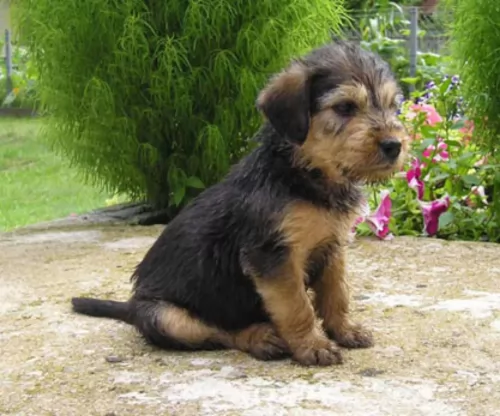 The medium to large sized dog is known for his coarse, shaggy coat of wheaten, black, red or grey shades. Some dogs are bi- or tri-colored. The shaggy coat has a thick undercoat and this is what provides insulation for the dog to cope in extremely cold weather conditions. He is a moderate shedder and he will need to be brushed thoroughly twice a week to remove his loose hairs.
The medium to large sized dog is known for his coarse, shaggy coat of wheaten, black, red or grey shades. Some dogs are bi- or tri-colored. The shaggy coat has a thick undercoat and this is what provides insulation for the dog to cope in extremely cold weather conditions. He is a moderate shedder and he will need to be brushed thoroughly twice a week to remove his loose hairs.
Some dogs have white marks on the head. The height of this dog ranges between 46–55cm at the withers and he can weigh in at between 16–24kg. He is well known for his facial hair – a moustache and beard on the muzzle with large, brown eyes and an intelligent, alert and playful expression.The Bosnian Coarse Haired Hound is a robust dog with a deep chest that provides him with a well proportioned appearance. The brown eyes have bushy eyebrows, the ears fairly long and floppy and the tail long and somewhat feathery.
The Bosnian Coarse-haired Hound makes an exceptional pet because he is loyal and friendly with his family members and patient and tolerant of children’s antics. He also gets on well with other pets in the house.
 All three types of Griffons are toy size dogs with short, thick bodies and distinctive brachycephalic heads. Regardless of coat color their muzzles and whiskers are black, and they have large eyes, also black, a mustache and beard. They have black eyelashes and a nose that is very black. All this is set against their red, beige, black or black and tan coat. Their forehead is dome shaped and the muzzle is short. The breed has small ears that are high up on the dog’s head. The ears might be cropped in the United States but would not be in Europe. The lower jaw is prominent and the jaw itself is undershot. They have black toenails and pads, with strong and muscular hind legs. The Griffon has a docked, high set tail in the U.S. and a full tail in Europe and all of the United Kingdom.
All three types of Griffons are toy size dogs with short, thick bodies and distinctive brachycephalic heads. Regardless of coat color their muzzles and whiskers are black, and they have large eyes, also black, a mustache and beard. They have black eyelashes and a nose that is very black. All this is set against their red, beige, black or black and tan coat. Their forehead is dome shaped and the muzzle is short. The breed has small ears that are high up on the dog’s head. The ears might be cropped in the United States but would not be in Europe. The lower jaw is prominent and the jaw itself is undershot. They have black toenails and pads, with strong and muscular hind legs. The Griffon has a docked, high set tail in the U.S. and a full tail in Europe and all of the United Kingdom.
The rough coated types have a dense and wiry coat and the standard encourages the hardest possible wire coat. Their heads are also wiry and long around the chin, cheeks, nose and eyes. They should be hand-stripped and never left ungroomed. The coat can matt if not taken care of adequately. One of the most important features of the Brussels Griffon is its human like face or monkey like appearance.
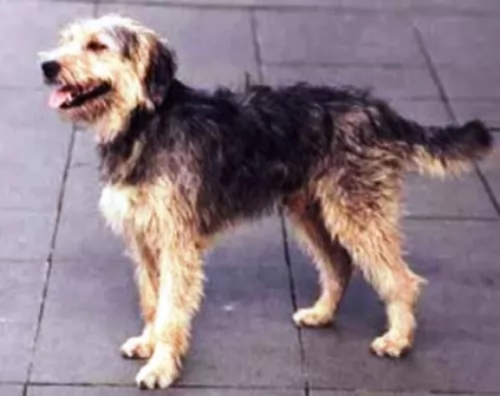 Bosnian Coarse-Haired Hounds are loyal, loving dogs. They are intelligent too and easy to train. With training and socialization, they are well behaved and a pleasure to have in the home. He makes an excellent pet for any family who bears in mind that he needs lots of exercise. When he uses up his energy with games, walks and other activities, he becomes a playful friend with children in the house.
Bosnian Coarse-Haired Hounds are loyal, loving dogs. They are intelligent too and easy to train. With training and socialization, they are well behaved and a pleasure to have in the home. He makes an excellent pet for any family who bears in mind that he needs lots of exercise. When he uses up his energy with games, walks and other activities, he becomes a playful friend with children in the house.
His temperament fits his tousled looks and he is outgoing, amicable, social and friendly. He wants to be a member of the family and to be part of all the activities going on. When he is happy and well cared for, he makes a splendid pet.
 The Brussels Griffon is sociable, alert and very intelligent. She is very energetic, playful and loving. They bond deeply with their family. Housebreaking might be a challenge as it is with all toy/small breeds. They are incredibly lonely and restless when their people are not around them. They have great personalities, terrier like characteristics, and deep loyalty to their humans. They are great companions and love children. Just remember how small they are. They are susceptible to Little Dog Syndrome if the human does not establish themselves as the alpha right away.
The Brussels Griffon is sociable, alert and very intelligent. She is very energetic, playful and loving. They bond deeply with their family. Housebreaking might be a challenge as it is with all toy/small breeds. They are incredibly lonely and restless when their people are not around them. They have great personalities, terrier like characteristics, and deep loyalty to their humans. They are great companions and love children. Just remember how small they are. They are susceptible to Little Dog Syndrome if the human does not establish themselves as the alpha right away.
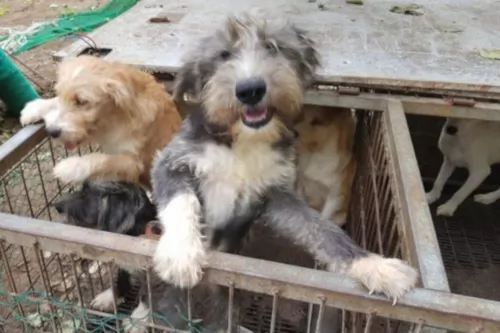 The Bosnian Coarse-Haired Hound is a generally healthy breed, but just like with other dogs, he can also be prone to some hereditary health issues.
The Bosnian Coarse-Haired Hound is a generally healthy breed, but just like with other dogs, he can also be prone to some hereditary health issues.
This is essentially a kind of degenerative arthritis and can be painful for your pet. You’ll notice that he battles to get up after lying down. There are some treatment options that can alleviate his pain and make him more comfortable, but there is no cure.
It is essentially where the dog’s hips partially dislocate and it is a genetic condition. It is more usual in larger dogs but any dogs can battle with hip dysplasia.
This occurs when your dog’s kneecap is dislocated. It can be a genetic malformation or trauma. A dislocated kneecap is a common knee joint abnormality and a dog with a dislocated kneecap will have abnormal hind-limb movement, occasional skipping and even lameness.
 The Brussels Griffon is susceptible to many of the diseases and genetic conditions that many other toy or small dogs have. Flat-faced breeds like the Griffon also suffer from difficulty with breathing under certain weather conditions and they are known to snore. They should not be kept in hot, sunny, humid climates for this reason. They may also display patella luxation (slipping kneecaps) and hip dysplasia. Lastly, they are susceptible to ear infections. Dams are often in need of cesarean sections to deliver their litters. They have very serious health issues due to the head shape and flat face. These might include eye and respiratory issues and syringomyelia – a deadly neurological disease. They are susceptible to epilepsy, dental issues and eye lash issues.
The Brussels Griffon is susceptible to many of the diseases and genetic conditions that many other toy or small dogs have. Flat-faced breeds like the Griffon also suffer from difficulty with breathing under certain weather conditions and they are known to snore. They should not be kept in hot, sunny, humid climates for this reason. They may also display patella luxation (slipping kneecaps) and hip dysplasia. Lastly, they are susceptible to ear infections. Dams are often in need of cesarean sections to deliver their litters. They have very serious health issues due to the head shape and flat face. These might include eye and respiratory issues and syringomyelia – a deadly neurological disease. They are susceptible to epilepsy, dental issues and eye lash issues.
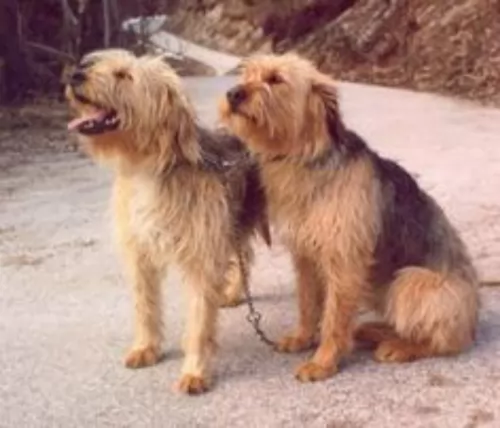 This bearded dog is energetic so he will need to be exercised by you. You can take him on walks or take him to the park or play ball games with him. He will be prone to excessive barking and other kinds of destructive behavior through no fault of his own if you buy a pet like this and just plonk him in your back garden. He wants to be a part of your family and exercising him daily is part of owning a pet like the Bosnian Coarse Haired Hound.
This bearded dog is energetic so he will need to be exercised by you. You can take him on walks or take him to the park or play ball games with him. He will be prone to excessive barking and other kinds of destructive behavior through no fault of his own if you buy a pet like this and just plonk him in your back garden. He wants to be a part of your family and exercising him daily is part of owning a pet like the Bosnian Coarse Haired Hound.
The Bosnian Coarse Haired Hound is a strong-willed dog and intelligent too. Train him and socialize him because then he becomes such an obedient, amicable pet who just wants to please.
Your Barak is an energetic breed so he will need top quality food packed with vitamins and minerals that can provide him with the energy he needs. When it comes to feeding your Bosnian Coarse Haired Hound, store-bought dog food comes in a dry form or wet canned form.
If you’re unfamiliar with these foods, you can also speak to your veterinarian about the best food for your pet. Many dogs are lucky because their owners provide homemade diets – raw or cooked meat, vegetables and rice. A good multivitamin with omega 3 is also recommended for your pet as this can ensure his coat is shiny and his eyes bright and alert. Fresh, cool water must be within reach day and night.
 The Brussels Griffon can choke easily so take care with the size of kibble you feed them. They need about one fourth to one half of a cup of high quality dry food that is designed for small or toy dogs. Divide this amount into two or three small meals per day. Puppies should be fed more often than adults but never feed just one large meal per day. Be careful that your Brussels Griffon does not become obese.
The Brussels Griffon can choke easily so take care with the size of kibble you feed them. They need about one fourth to one half of a cup of high quality dry food that is designed for small or toy dogs. Divide this amount into two or three small meals per day. Puppies should be fed more often than adults but never feed just one large meal per day. Be careful that your Brussels Griffon does not become obese.
The Brussels Griffon, regardless of type has some very serious health issues due to the shape of their heads.
Brachycephalic Syndrome – This can cause all the respiratory issues as well as eye issues such as cataracts and corneal ulcers.
This is a very playful and energetic breed that needs at least some exercise every day. They love to play with their family. They are smart and easy to train. They love agility, obedience, barn hunt and tracking activities. You can just as effectively play with and exercise your Brussels inside as well as out.